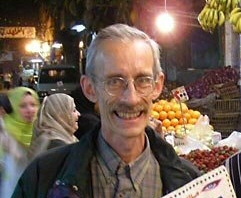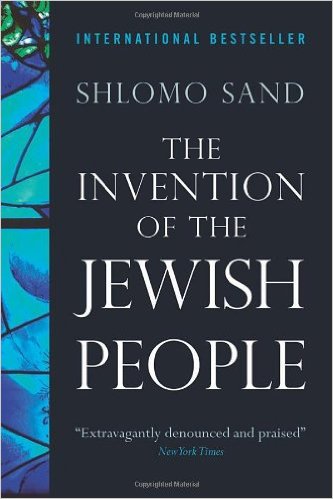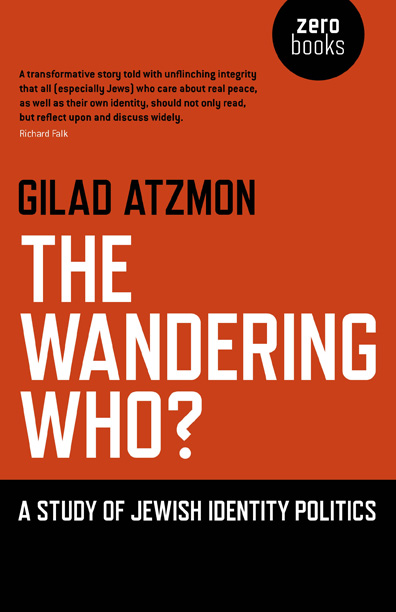www.aljazeerah.info
Opinion Editorials, August, 2016
Archives
Mission & Name
Conflict Terminology
Editorials
Gaza Holocaust
Gulf War
Isdood
Islam
News
News Photos
Opinion Editorials
US Foreign Policy (Dr. El-Najjar's Articles)
www.aljazeerah.info
Renouncing Jewishness: Shlomo Sand and Gilad Atzmon
By Eric Walberg

Al-Jazeerah, CCUN, August 2, 2016
 |
 |
 |
| Shlomo Sand launching 'How I Stopped Being a Jew' |
For years now, I've known there was something wrong when my well-meaning
anti-Zionist Jewish friends found it necessary to join Jewish anti-Zionist
groups opposing Israel. In the US, Jewish Voice for Peace, in Canada, Not in
Our Name; in Britain, Jews Against Zionism -- every country has its group,
usually more than one. "I am a Jewish witness against Israel," I would be
told. Sounds good, even brave. Sand's latest deconstruction of Jewishness
and Israel, How I Stopped Being a Jew (2014), makes it clear why my
suspicions were well founded.
Barely 100 pages, it is a page-turner,
a precis of his earlier more scholarly works, arguing that the romantic,
heroic age of Jewish nationalism, as embodied in the creation of a Jewish
state, is coming to an end. Israel will not disappear, but it is an
anachronism, an embarrassment in the postmodern age. A reminder of the
horrors of Nazism, but not as the Zionist crafters of the "holocaust
industry", or "holocaust religion", would have it. The Zionist project is
exposed by Norman Finkelstein, Noam Chomsky, Gilad Atzmon, Israel Shamir and
many more Jewish critics as reenacting the same policies of yesteryear. A
flawed answer that is doomed, "an
insidious form of racism".
For the Israeli Sand, the
Jewish "national" identity is a fraud (an Israeli identity is fine); the
only viable Jewish identity is a religious one, and as a nonbeliever, he
logically concludes, "Cogito, ergo non sum."
Gilad Atzmon
takes Sand's logic further. He tore up his Israeli passport, becoming an
ex-Israeli as well as an ex-Jew.
What's so wrong with a secular,
ethnic Jewish identity? Well, it can be based on only one of two things:
persecution (being "forced" into being a Jew whether one likes it or not, as
in the Nazi's racial laws) or being "born" into the Jewish people. The
former is no longer an issue and the latter is full of holes, and based on a
dangerous myth.
When was the Jewish People invented?
Sand's answer is simple: "At a certain stage in the 19th century,
intellectuals of Jewish origin in Germany, influenced by the folk character
of German nationalism, took upon themselves the task of inventing a people
'retrospectively', out of a thirst to create a modern Jewish people." For
Jews, this required a homeland, and the westernized Jewish elite were able
to provide this. As the West suffered one mortal blow after another
(WWI&II), Zionism took on a new meaning. Voila! Israel.
But the exile
legend is a myth. Sand is a historian and couldn't find any texts supporting
it. The Romans did not exile peoples. "Judaic society was not dispersed and
was not exiled." Jews continued to live in the Holy Land through thick and
thin, freer under Muslim rule than Christian, but even the latter never
"ethnically cleansed" them. Most converted to Christianity or Islam. Voila!
The (Christian, Muslim) Palestinians. However, a tiny core stuck stubbornly
to the original monotheism, nurtured by the Babylonian exile in the 6th
century BC (the only bona fide exile--from which they returned, the earlier
Egyptian exile legend being crafted much later, when the Torah was written
down and collected in the 3rd century BC).
Jews are not a race but
rather a collective of many ethnic groups who were hijacked by a late 19th
century 'national' movement. There is no racial or ethnic basis for being
Jewish any more than there is for being Christian or Muslim. The great
majority of those who today consider themselves Jewish are descended from
converts in Central Asia, eastern Europe and north Africa, not from ancient
Hebrews expelled from the Holy Land by the Romans. They are not ethnic
“Semites”, of near eastern origin, or ethnic anything else.
Atzmon
is a noted jazz musician, and
deconstructs a popular 1970s Israeli pop song by Shlomo Artzi: All of a
sudden a man wakes up in the morning. He feels he is people and to
Scene
from Shoval's 'Youth' (2016)
everyone he comes across he says shalom.
Artzi's youth suggests Jews suddenly became "people" thanks to the state of
Israel, conflating being Jewish with being Israeli, suggesting only Israelis
can really feel free as Jews. What Artzi ignores is that feeling proud to be
an Israeli is only for those Israelis who have "Jew" stamped in their
passport, and, among them, only those who are blind to the bloody colonial
basis for this privilege. Hardly a recipe for a healthy feeling.
Can a liar tell the truth?
Israel is a “democratic
and Jewish state” according to Israeli law. The "Jewish" nature was first
defined in the Declaration of Independence of 1948. The "democratic"
character was added by the Knesset in 1985. This is a contradiction in
terms, as Jewish by definition determines the state according to race,
making it undemocratic for those in the state not Jewish. In cartesian
lingo, both 'A' and 'not A' are true.
This flawed logic now lies at
the heart of what it means to call oneself a secular Jew, either Israeli or
'diaspora'. Sand joins other ex-Jews, Gilad Atzmon, Israel Shamir, and Will
Self, who have renounced Jewishness, either as secularists, or as converts
to Christianity, shedding a contradictory, now empty, signifier. Given
what Israel has become, "democratic" and "Jewish" are no longer compatible.
Sand rejects the faux Jewish nationalism served up by Zionism, which
excludes non-Jews from the narrative, and is left with nothing except
himself, his books, his sense of right and wrong. A lonely world.
Atzmon takes Sand's attack on identity politics a step further, arguing in
The Wandering Who that secular Jewish anti-Zionism feeds into the Zionist
narrative, the do-gooder counterpoint to the more sinister role of the
diaspora, taking Sand's concerns to an even more uncomfortable conclusion:
The Jewish Diaspora is there to mobilize lobbies by recruiting international
support. The Neocons transform the American army into an Israeli mission
force. Anti-Zionists of Jewish descent (and this may even include proud
self-haters such as myself) are there to portray an image of ideological
plurality and ethical concern.*
Sand dismisses both religion and
nationalism as the basis for his identity. Atzmon argues
both are legitimate, though they both are perverted in the case of the
Israeli state. Nationalism is an authentic "bond with one’s soil, heritage,
culture, language", a cathartic experience, not at all "empty" as a
signifier. Though nationalism may well be an invention, it is still
"an intrinsically authentic fulfilling experience". It can be misused, is
often suicidal, but nonetheless, "it sometimes manages to integrate man,
soil and sacrifice into a state of spiritual unification."
What is
especially moving about ex-Jews like Sand, and ex-Israel ex-Jews like Atzmon,
is that they are trapped by their own Israeli heritage, whether or not they
emigrate. Reading Sand's book in Hebrew, writes Atzmon, "is for me, an
ex-Jew and ex-Israeli, a truly authentic experience that brings me closer to
my roots, my forgotten homeland and its fading landscape, my mother tongue
or shall I simply say my Being." He is confronted not by some "‘identity’ or
politics but rather the Israeliness, that concrete nationalist discourse
that matured into Hebraic poetry, patriotism, ideology, jargon, a dream and
a tragedy to follow." Israel's present state has "robbed
him of that Israeliness which was once to him a home."
Hollow identity
Most still yearn to keep a diaspora
Jewish identity alive. Judith Butler’s Parting Ways: Jewishness and the
Critique of Zionism (2013) is by a liberal-leaning Jew who feels she
must salvage her Jewishness from Israel’s nationalism and occupation
policies. "A new Jewish identity might emerge that connects Tel Aviv with
New York’s Upper West Side, Berlin, Paris, London and Buenos Aires -- and
all of them on an equal footing," writes Carlo Strener in his
review.
For Sand and Atzmon, there is no "new Jewish
identity" possible, because there is no diaspora. French Jews are French.
Canadian ones are Canadian. It's fine to be a believing 'person of the
Book', and even an Israeli, speaking Israeli (really a new language) and
being a citizen of a well-behaved multi-ethnic nation state, based on
universal norms, like France or Canada. But everyone eats matzo balls
already.
Assimilation is not like extermination, despite Golda
Meir's
cries of "Wolf!" Non-religious Jewishness will continue to evaporate,
along with Christian and Muslim identities for those who abandon their
faith. There is no shame in calling oneself an ex-Christian or ex-Muslim.
Occam's Razor: less is more
Anti-Zionists "rightly see
[Zionist] policies as threatening the renewal of Judeophobia" that
identifies all Jews as a "certain race-people, and confuses them with
Zionists.”** Yes, but, as Atzmon argues, this "confusion" is part of the
agenda, pushing Jews outside of Israel to support Israel unthinkingly and
accept the resultant resentment they experience as "anti-Semitism".
And even if they protest--as Jews--they inadvertently support the "Zionist
world conspiracy":
If those who call themselves anti-Zionist Jews
without having lived in Israel, and without knowing its language or having
experienced its culture, claim a particular right, different from that of
non-Jews, to make accusations against Israel, how can one criticize overt
pro-Zionists for granting themselves the privilege of actively intervening
in decisions regarding
Codepink's Medea Benjamin
the future and fate
of Israel?*
The Jewish signifier undermines the anti-Zionist one.
Slots muddy things. Medea Benjamin, a "one percenter, a nice little Jewish
girl" founded the now legendary peace group Codepink. QAIA (Queers against
Israeli apartheid) folded when its organizers realized by highlighting their
'gay' signifier, they were doing more harm than good. The queers don't have
the luxury of renouncing their queerness, but thoughtful Jews like Benjamin
similarly downplay their own tribalism, and Sand and Atzmon have renounced
it, as the honorable way out of their Catch-22.
xxx
* Gilad Atzmon, The Wandering Who?, Zero Books, 2011, p70.
** Shlomo Sand, How I Stopped being a Jew, Verso, 2014, p94--95.
***Share this article with your facebook friends
|
|
|
|
||
|
||||||


